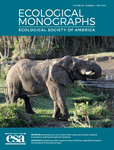
ECOLOGICAL MONOGRAPHS
metrics 2024
Illuminating ecological insights for a sustainable future.
Introduction
ECOLOGICAL MONOGRAPHS, published by WILEY, stands as a premier journal in the field of ecology, evolution, behavior, and systematics, with an impressive impact factor and ranking in the 96th percentile among its peers. Since its inception in 1974, this journal has offered comprehensive insights and advanced knowledge on ecological phenomena, serving as a vital resource for researchers, professionals, and students alike. With its commitment to publishing high-quality, peer-reviewed articles, it operates within the esteemed Q1 category of ecology, solidifying its reputation as a leading platform for innovative research. Though not available as open access, ECOLOGICAL MONOGRAPHS ensures broad reach and visibility through its rigorous editorial standards and substantial scholarly contributions. As it continues to aggregate vital ecological data and synthesize research across multiple converged years, this journal remains invaluable for those dedicated to understanding complex ecological interactions and their implications for environmental policy and management.
Metrics 2024
 2.70
2.70 7.10
7.10 9.00
9.00 173
173Metrics History
Rank 2024
Scopus
IF (Web Of Science)
JCI (Web Of Science)
Quartile History
Similar Journals
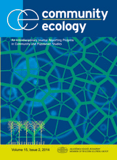
COMMUNITY ECOLOGY
Advancing Understanding of Community DynamicsCOMMUNITY ECOLOGY is a distinguished journal published by Springer Heidelberg that focuses on the intricate dynamics of ecological interactions within communities. Established in 2000 and continuing robustly through to 2024, this journal aims to disseminate significant research findings that contribute to the understanding of ecological processes, species interactions, and community structures. With an ISSN of 1585-8553 and an E-ISSN of 1588-2756, the journal holds a commendable position in the academic sphere, reflected in its Q2 quartile rankings in the categories of Ecology and Ecology, Evolution, Behavior and Systematics. It boasts an impressive Scopus ranking within the 57th percentile for both Agricultural and Biological Sciences and Environmental Science fields, attesting to its relevance and influence. Though it does not currently operate under an open access model, COMMUNITY ECOLOGY remains a vital resource for researchers, professionals, and students eager to advance their knowledge in community ecology, highlighting the importance of collaborative research in addressing ecological challenges globally.

Annual Review of Ecology Evolution and Systematics
Pioneering Research in Ecology, Evolution, and SystematicsThe Annual Review of Ecology, Evolution, and Systematics, published by Annual Reviews, is a leading academic journal dedicated to advancing the understanding of ecological and evolutionary processes. With a commendable impact factor and impressive rankings—9th in both the Ecology, Evolution, Behavior and Systematics category and the Environmental Science category—this journal is recognized for its rigorous peer-reviewed articles that synthesize research findings across a wide range of topics within the fields of ecology and evolutionary biology. Established in 2003, this annual publication aims to provide researchers, professionals, and students with comprehensive insights into the latest developments and trends within these dynamic disciplines. By facilitating access to high-quality scholarly articles, the Annual Review of Ecology, Evolution, and Systematics continues to play a crucial role in fostering scientific discourse and discovery.

Ecologies
Connecting research to action in the face of ecological challenges.Ecologies is a dynamic open-access journal published by MDPI, based in Switzerland, which focuses on the interdisciplinary study of ecological and environmental sciences. Since its inception in 2020, the journal has made significant strides in contributing to our understanding of complex ecological interactions, evolutionary processes, and the implications of biological diversity on ecosystem functionality. With its categorization in Q2 for Ecology and various Q3 rankings in related fields, it proudly offers a platform for innovative research that aims to address pressing ecological challenges. Researchers, professionals, and students can benefit from its comprehensive and insightful articles that are freely accessible, ensuring that critical findings are disseminated widely to facilitate informed decision-making and foster collaboration across disciplines. With the impact of climate change and biodiversity loss at the forefront of global discussions, Ecologies plays a pivotal role in shaping the future of ecological research and policy implementation.
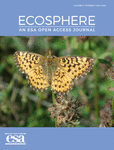
Ecosphere
Exploring the intricate web of life and its systems.Ecosphere is a leading open-access journal published by WILEY, dedicated to advancing research in the fields of ecology, evolution, behavior, and systematics. Established in 2010 and headquartered in the United States, this innovative journal provides a platform for the exchange of cutting-edge scientific knowledge and discovery, fulfilling its mission to enhance our understanding of ecological systems and their interactions. With a prestigious impact factor reflecting its commitment to high-quality research, Ecosphere is ranked Q1 in both Ecology and Ecology, Evolution, Behavior, and Systematics for 2023, further solidifying its prominence in the scientific community. The journal's scope includes a wide array of topics related to environmental science, making it an essential resource for researchers, professionals, and students aiming to stay at the forefront of ecological research. It offers comprehensive open access options, ensuring that groundbreaking findings are readily available to a global audience, thus fostering collaboration and innovation in the field.
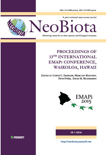
NeoBiota
Championing innovative research in ecology and conservation.NeoBiota, published by Pensoft Publishers in Bulgaria, is a preeminent Open Access journal dedicated to advancing knowledge in biodiversity, ecology, and conservation science. Since its inception in 2011, it has established itself as a pivotal platform for scholarly discourse, maintaining an impressive impact factor that places it in the Q1 quartile across multiple categories, including Animal Science and Zoology, Aquatic Science, and Ecology. With its articles indexed in leading databases and Scopus rankings that affirm its standing (e.g., rank #12 in Animal Science and Zoology), NeoBiota serves as a vital resource for researchers, professionals, and students. The journal emphasizes the synthesis of ecological modeling and evolutionary processes, fostering interdisciplinary collaboration and promoting rigorous research methodologies. Authors are encouraged to contribute their insights on biodiversity metrics, ecosystem dynamics, and the ecological implications of anthropogenic changes, making NeoBiota essential for anyone invested in the future of our planet's ecosystems. Discover the treasures of ecological scholarship through this influential journal.

Theoretical Ecology
Transforming ecological studies through theoretical excellence.Theoretical Ecology, published by SPRINGER HEIDELBERG, is a premier journal in the field of ecological modeling and theory, exemplifying the intersection of rigorous quantitative analysis and ecological understanding. With its ISSN 1874-1738 and E-ISSN 1874-1746, this journal has been a valuable resource for researchers since its inception in 2008, with a commitment to publish cutting-edge research until 2024. The journal's 2023 category quartiles demonstrate its impact, ranking Q3 in Ecological Modeling and Q2 in Ecology, reflecting its significance within the academic community. Furthermore, its Scopus rankings position it among the top tier of environmental science journals, ranking #181/461 in Ecology and #21/41 in Ecological Modeling. While the journal does not offer open access, it is an essential publication for those looking to deepen their understanding of theoretical frameworks that drive ecological research and practice. By providing a platform for innovative theories and models, Theoretical Ecology plays a crucial role in shaping future ecological studies and informing policy decisions in environmental management.

Neotropical Biodiversity
Fostering collaboration for ecological resilience in the Neotropics.Neotropical Biodiversity is a prominent journal dedicated to advancing our understanding of biodiversity and ecological dynamics within the Neotropical region. Published by TAYLOR & FRANCIS LTD in the United Kingdom, this Open Access journal has been providing unrestricted access to research findings since 2015, fostering collaboration and knowledge sharing among the global scientific community. With an emphasis on innovative research in Ecology, Ecology, Evolution, Behavior and Systematics, and Global and Planetary Change, it has earned a reputation for excellence, currently holding a Q3 category in its field. As of 2023, the journal ranks in the 37th percentile for Environmental Science (Ecology) and in the 36th percentile for Agricultural and Biological Sciences (Ecology, Evolution, Behavior and Systematics), making it a valuable resource for researchers, professionals, and students interested in understanding and preserving biodiversity in one of the world's most diverse ecosystems. We invite you to explore the cutting-edge research published in Neotropical Biodiversity and contribute to the ongoing dialogue for environmental sustainability and ecological resilience.

BIOTA NEOTROPICA
Connecting Scientists to Unravel Nature's MysteriesBIOTA NEOTROPICA is a prominent open access journal dedicated to advancing knowledge in the interdisciplinary field of ecology, evolution, behavior, and systematics. Published by REVISTA BIOTA NEOTROPICA since 2001, this Brazilian journal aims to provide a platform for high-quality research that fosters a deeper understanding of Neotropical biodiversity and its conservation. With an ISSN of 1676-0603 and an E-ISSN of 1676-0611, the journal has established its reputation within academic circles, ranking in the Q3 quartile for Ecology and achieving a respectable percentile of 57 in Scopus’s metrics. Operating from its headquarters in Campinas, SP, Brazil, BIOTA NEOTROPICA not only focuses on research dissemination but also encourages collaboration and exchange of ideas among scientists, students, and professionals in the field. The journal is particularly valuable for those looking to contribute to the understanding of ecological systems and promotes accessibility with its open access model.
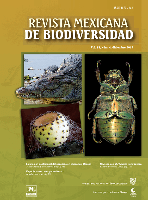
Revista Mexicana de Biodiversidad
Fostering Global Dialogue on Biodiversity and ConservationRevista Mexicana de Biodiversidad is a prominent academic journal dedicated to the field of biodiversity and conservation, published by the prestigious Instituto de Biología, Universidad Nacional Autónoma de México. Since its inception as an Open Access publication in 2005, it has aimed to disseminate high-quality research that advances the understanding of biological diversity in Mexico and beyond. With an ISSN of 1870-3453 and an E-ISSN of 2007-8706, the journal caters to a diverse audience, including researchers, professionals, and students, by providing vital insights into ecological studies, conservation strategies, and the sustainable management of natural resources. The journal is committed to fostering scientific collaboration and promoting the significance of biodiversity in addressing contemporary environmental challenges. By publishing innovative and impactful research, the Revista Mexicana de Biodiversidad plays an essential role in the global discourse on biodiversity conservation.
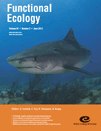
FUNCTIONAL ECOLOGY
Decoding Ecosystem Dynamics for Tomorrow's ChallengesFUNCTIONAL ECOLOGY is a premier journal published by WILEY that delves into the intricate relationships of organisms and their environments, addressing key themes in ecology, evolution, behavior, and systematics. Established in 1987, this influential publication has made strides in both foundational research and applied science, boasting a remarkable impact factor that positions it in the Q1 category for Ecology, Evolution, Behavior, and Systematics. With a Scopus ranking of #48 out of 721 in its field, it represents the cutting edge of ecological research, appealing to a diverse audience that includes researchers, professionals, and students striving to comprehend and address ecological challenges. Although the journal does not currently provide Open Access options, it remains a vital resource for those looking to deepen their understanding of functional ecology and its practical applications in sustainability and conservation. Join the community of scholars advancing ecological knowledge and its relevance in today's rapidly changing world.